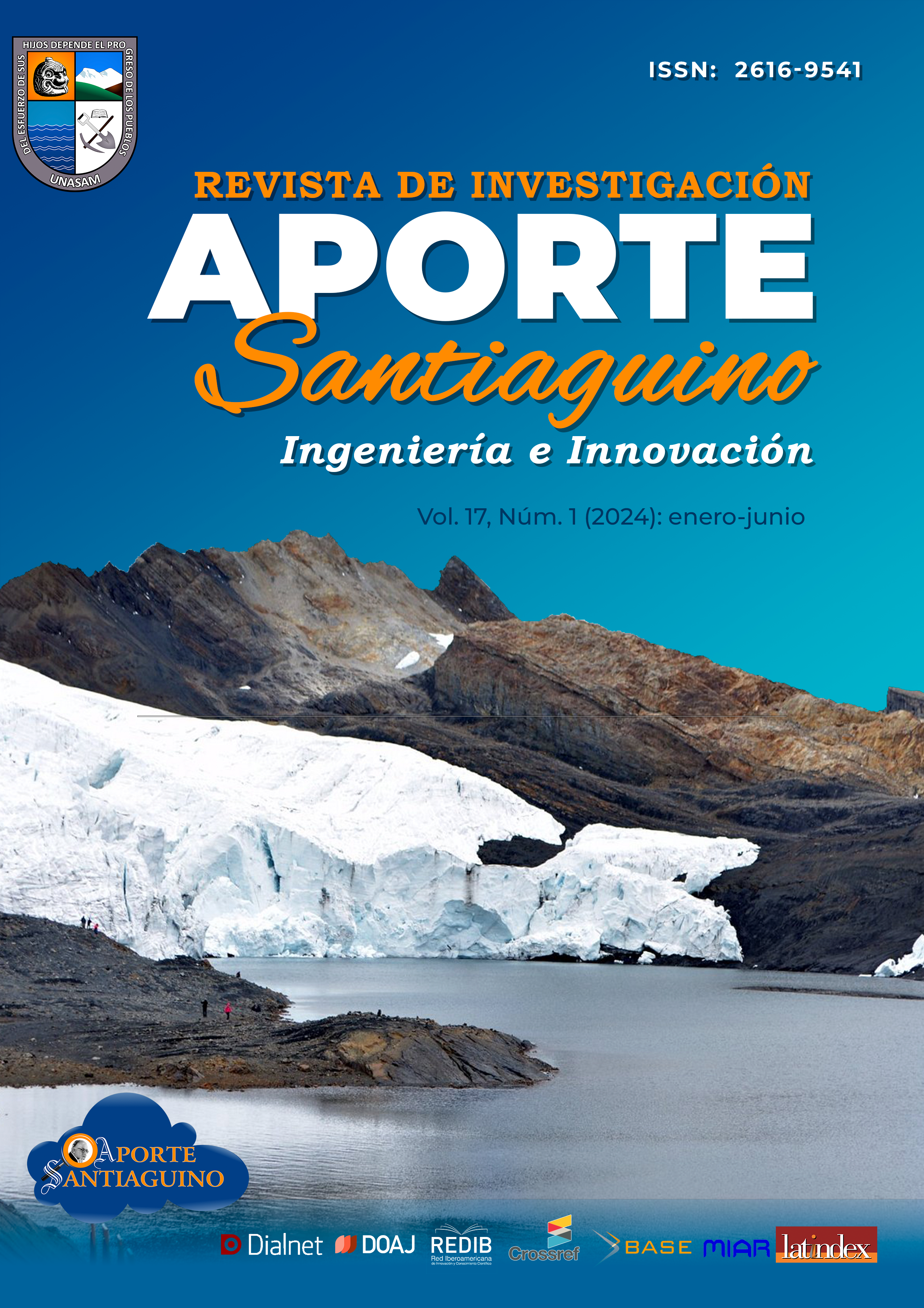Earthquake resistant structure system of the Waullac ruins in Huaraz -Perú, 2023
DOI:
https://doi.org/10.32911/as.2024.v17.n1.1117Keywords:
Structural components; structural system; earthquake resistant structureAbstract
This research aimed to understand the earthquake-resistant structural system of the ruins of Waullac in Huaraz - Perú, 2023. The methodology has non experimental, descriptive and transversal design, the population is made up of the ruins of Huaraz, with non probabilistic sample. The technique and data collection format was observation and information on the material, shape and size was collected using a form; For the results, the E.030 earthquake resistant design standard was used. The results describe, the ruins are composed of earth, stones and vegetation. Stones with average measurements: type 1 diameter 6cm; type 2 diameter between 17-35cm; type 3 thickness 2-6cm with length 30cm and width 20cm; type 4 large stone thickness 32cm, width 46,6cm and length 1,2m; type 5 extra large stones of 1,70-4,10m. The structural system of the Waullac ruins is made up of four structural components: foundation, on foundation, walls and roof. In conclusion, the ruins dissipate seismic energy through contact stress and movement between the structural components; They comply with the philosophy of the E 030 standard, present stability, do not collapse, withstand earthquakes and prevent loss of life. It is concluded that the ruins of Waullac have an earthquake resistant structure system.
Downloads
References
Barrón, D. y Zubieta, F. (2020). 1970: La hecatombe de Áncash. https://www.academia.edu/43289086/1970_LA_HECATOMBE_DE_%C3%81NCASH
Borja, M. (2016). Metodología de la Investigación Científica para Ingenieros. https://www.academia.edu/33692697/Metodolog%C3%ADa_de_Investigaci%C3%B3n_Cient%C3%ADfica_para_ingenier%C3%ADa_Civil
Cervera, M. y Blanco, E. (2014). Mecánica de estructuras. CIMNE. https://doi.org/10.5821/ebook-9788498802139
Heras, H. (2002). Análisis de la distribución del valor de “b” en la zona de subducción de Perú [Tesis de Título, Universidad Nacional de San Agustín de Arequipa]. http://hdl.handle.net/20.500.12816/1311
Herráiz, M. (1997). Conceptos Básicos de Sismología para Ingenieros. CISMID. https://ingenieriacivillib.wixsite.com/library/single-post/2017/04/17/conceptos-b%C3%A1sicos-de-sismolog%C3%ADa-para-ingenieros
Mejía, A. (2019). Las evidencias arqueológicas de Huaraz en el desarrollo de la competencia Construye interpretaciones históricas de los estudiantes del primer grado de secundaria de la institución educativa “Santa Rosa de Viterbo” – Huaraz 2019 [Tesis de licenciatura, Universidad Nacional Santiago Antúnez de Mayolo]. http://repositorio.unasam.edu.pe/handle/UNASAM/4825
Ministerio de Vivienda, Construcción y Saneamiento (2018). Reglamento Nacional de Edificaciones. Norma de diseño Sismorresistente E.030. https://cdn-web.construccion.org/normas/rne2012/rne2006/files/titulo3/02_E/2018_E030_RM-355-2018-VIVIENDA_Peruano.pdf
Ministerio de Vivienda, Construcción y Saneamiento (2006). Reglamento Nacional de Edificaciones. Norma de cargas E.020. https://cdn-web.construccion.org/normas/rne2012/rne2006/files/titulo3/02_E/RNE2006_E_020.pdf
Ordoñez, J. (2005). Cálculo de la energía liberada por sismo a distancias telesísmicas mediante el Método de la Integral del Espectro de Potencia de las Ondas de Volumen [Tesis de Título, Universidad Nacional Pedro Ruiz Gallo]. https://repositorio.igp.gob.pe/bitstream/handle/20.500.12816/1317/tesisOrdo%c3%b1ez.pdf?sequence=1&isAllowed=y
Downloads
Published
How to Cite
Issue
Section
License
Copyright (c) 2024 Wilder Rimac Mendez, Jaime Walter Blas Cano

This work is licensed under a Creative Commons Attribution 4.0 International License.




















